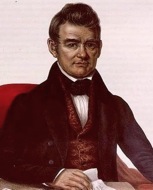Born on October 3, 1790 at Turkeytown, Alabama, John Ross was the son of Daniel Ross, a Scotsman who had gone to live among the Cherokee. Though only 1/8th Cherokee, Ross was of Indian Heritage through and through. He witnessed first hand the brutality of settlers and other Indians in constant raids on Cherokee villages.
As a young man he demonstrated his leadership on several successful missions, and Ross' quiet and reserved manner inspired confidence among both the settlers and Indians. Later during the War of 1812 he served as a assistant to the senior officers in the Cherokee regiment. During the Creek War of 1813-14, he fought alongside General Andrew Jackson and attained the rank of Lieutenant. In 1815, John Ross and Timothy Meigs opened a trading post on the Tennessee River in Chattanooga that soon became known as Ross' Landing. Soon, a mission was built at Ross’ Landing. Ross recognized the value of education and aided the missionaries in their effort to provide schooling for the Cherokee youth.
Ross' reputation resulted in him being named a chosen member of the Cherokee Nation Council in 1817. During that same year, the United States Government asked the Cherokee to begin ceding some of their lands and move west (despite an 1802 treaty which guaranteed the Cherokee perpetual right to their land). From 1819 until 1826, Ross was served as President of the National Cherokee Committee. In 1827, he participated in the drafting of the Cherokee Constitution (modeled after the U.S. Constitution). One year later, John Ross was elected Principal Chief of the Cherokee Nation, a position he held until his death in 1866.
Over the next ten years, Ross fought the white settlers who were attempting to displace the Cherokee from their lands. Fighting not with weapons, but with words, he turned to the press and the courts to support their cause. The discovery of gold in White County, Georgia in 1828 increased the intimidation from the state towards the Cherokee. Despite winning several court decisions, Ross' former comrade Andrew Jackson authorized the Indian Removal Act of 1830.
To continue reading about Chief John Ross, click here.
To return to the home page, click here.




